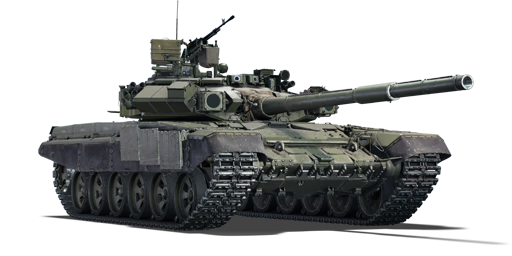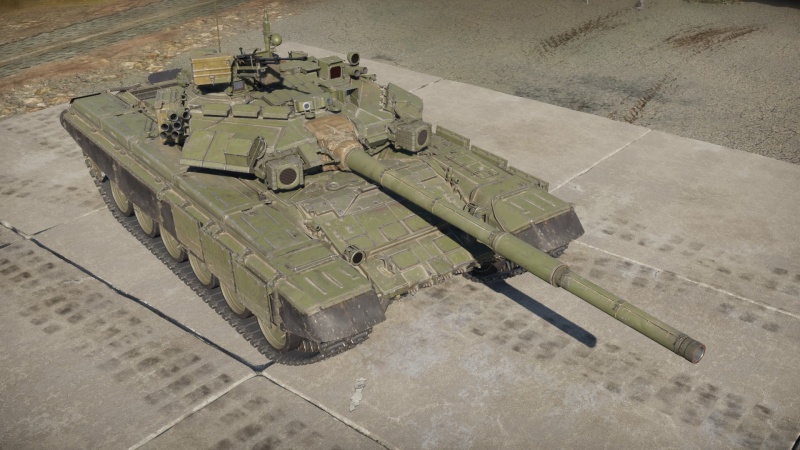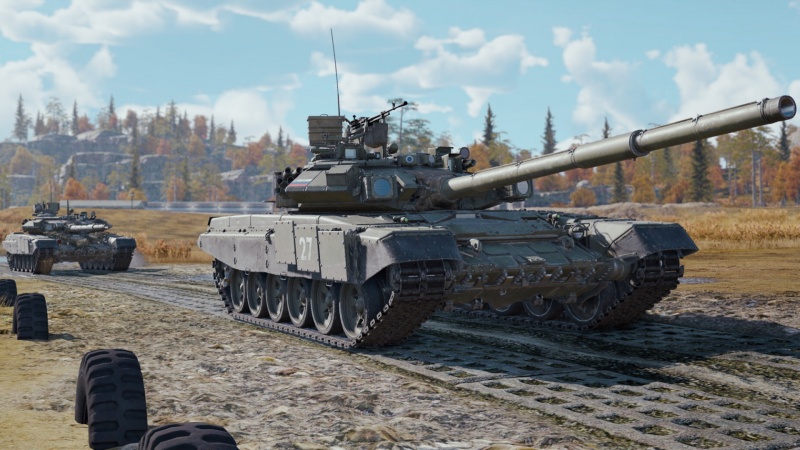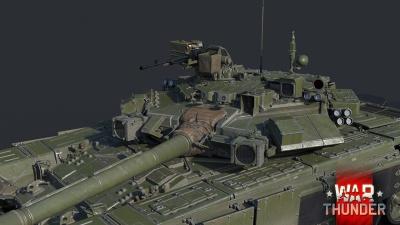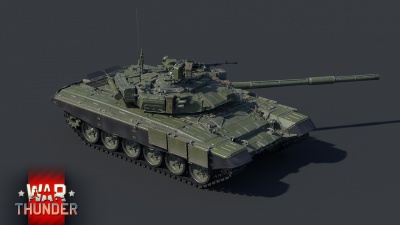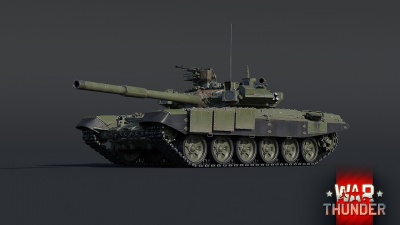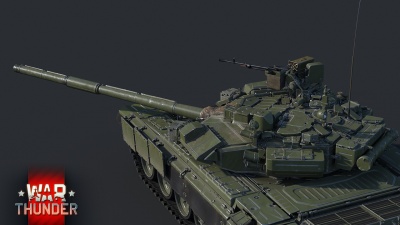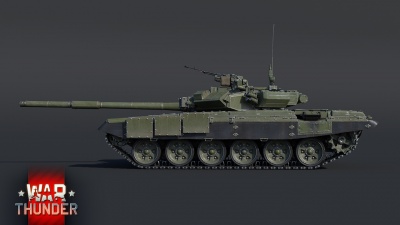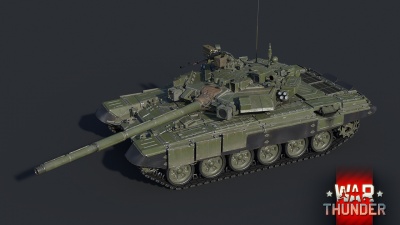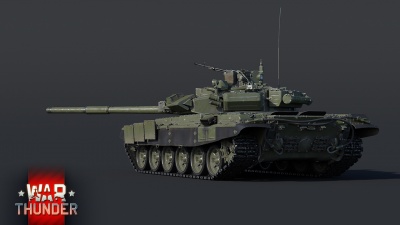T-90A
Contents
Description
The Т-90А is a rank Soviet medium tank with a battle rating of (AB), (RB), and (SB). It was introduced in Update "New Power".
The famous T-90A is a descendant of the T-72 (Family) that brings a lot of new features to the table. The new welded turret has improved protection and mounts two "Shtora" IR jammers that can interfere with the guidance of certain ATGMs. The gun now can use 9M119M "Refleks" tandem-warhead ATGMs, a very powerful 3BM60 APFSDS round, and a unique time-fused variant of the standard 3OF26 HE round. The gunner finally has access to a thermal sight, a laser warning system increases situational awareness, and a 1,000 horsepower engine improves the forward mobility considerably. Unfortunately, the T-90A is still slower than most contemporary tanks and the reverse speed is still a disappointing -5 km/h. The gun depression has in fact become worse than the T-72B at only 4 degrees. The T-90A demands careful positioning and is not forgiving of mistakes, but it is still a unique tank with many tricks up its sleeve.
The succeeding T-72B3 is an upgrade of the T-90A's ancestor, the T-72B (1989), with similar technology.
General info
Survivability and armour
Overall, the armour protection of the T-90A can be considered almost the same as in the T-72B3 and T-80U. However, despite the hull being exactly the same as the T-72B3 with same thickness, composition, and add-on armour, the turret of the T-90A shows a new turret design which can be considered better due to the armour layout and composition. The T-90A, as the T-72B (1989) and T-72B3, has access to the CONTACT-5 ERA. This ERA (different from Relict and CONTACT-1 seen in other T-72B series) has the particularity that has stopping power against APFSDS (similar to Dorchester). Different from other T-72s, the T-90A has a rolled homogeneous armour turret with spacing for composite armour blocks rather than built-in. Fuel tanks on either side of the driver can soak up some shrapnel and add to the overall survivability although they are most likely to be lit on fire if hit with HEATFS or an ATGM. However, as with all Russian autoloaded MBTs, there are only three crew members so a well-placed shot is capable of causing a crew knock-out. Despite having a carousel autoloader which is not protected by any blast shield like on the Leclerc and Type 90 MBTs, it is harder to ammo rack compared to the T-80s especially since the ammo is scattered horizontally on top of each other ("=" in this shape) and not in an L shape (in which charges are vertical and projectiles are horizontal). This reduces the chances of ammo rack compared to the T-80s. However, all side shots on the hull will be lethal regardless of the carousel as said shot will take your two crew members. The ERA offers really good protection against chemical energy penetrators such as HEATFS, ATGMs, and anti-tank grenades, having a protection of 420 mm against chemical energy and 120 mm against kinetic energy. This makes the tank capable of withstanding hits of all HEATFS of the BR (most of them penetrate between 320 mm to 480 mm) and ATGMs (between 400 mm to 1,000 mm). The ERA itself cannot stop all the spalling created by the premature explosion, the armour plating is what stops the spalling in case the ATGM has more penetration than what the ERA can withstand.
Shtora-1 Active Protection System
The T-90A has access to an infrared jammer, the Shtora-1 APS. It is a constant APS which provides protection against a wide variety of threats. The scanner-type jamming device (also known as "doom eyes" or "Russian eyes") is mounted on the front of the turret to cover the vulnerable frontal arc. It is called an "infrared countermeasure" because SACLOS guidance utilizes a beam-riding guidance which is connected to the GPS (gunner main sight in some cases, on others it is a different sight like on T-55AM-1 and T-62M-1) which uses a flare as reference point for the guidance system in the ATGM. The missile moves with the gunner's sight and the flare tries to stay on the crosshairs. IRCM confuses the GPS with a brighter IR light decoy acting as the flare (the flare is also IR) which signals the ATGM to move to a different position, overriding the gunner's flare. The Shtora-1 APS has a minimum jamming range of roughly 50 m, meaning it will only deviate ATGMs past 50 m although it depends on the ATGM speed and angle of attack. This is the approximate distance between all ATGMs in-game but it may vary. It will be able to jam a missile launched by a Swingfire faster due to its launch speed and flight path than an M3 Bradley. Shtora-1 has a field of view of 360 degrees horizontally (due to being turret mounted) and -5 to +25 degrees in elevation.
Shtora-1 will jam SACLOS missiles that are not equipped with ECCM systems. Laser-guided missiles (such as the AGM-114 Hellfire, MIM146 ADATS, etc) will not be jammed by Shtora-1. In order to let the APS work, it must be turned on ("Switch IRCM on/off" keybind). The APS can be destroyed.
Shtora-1 can be used while on the move (although turret must be facing the enemy). While on the move (especially horizontally), the jammed ATGM will move in an uncontrolled direction like normal jamming but riskier, keep this in mind as it can hit a track, engine deck or close enough to create fragmentation and mark the tank and/or friendlies. When moving towards an enemy who fired an ATGM, it will be affected by the APS but due to the momentum, the ATGM may still hit if it is redirected towards the ground. Shtora-1 creates a thermal signature which can be seen with thermal sights. It also can also be used as an IR spotlight (as shown in picture). This can be a disadvantage when in night maps as tanks with NVD (except when tanks are using thermal view) will be able to see the light beam. The APS should be turned on and off at commander's discretion. When on day maps, this will not be an issue. Shtora must have a clear line-of-sight with the enemy launcher (at least enemy sights must be able to see the tank). Tanks firing from behind cover like the Swingfire can also be affected by the APS. As long as the enemy is within the jamming arc, the T-90 will be protected against SACLOS ATGMs. Different from AMX-30B2 BRENUS, the T-90A has access to a Laser Warning Receiver (LWR) which lets the commander know when there is a laser aiming at them. The LWR will be triggered by laser rangefinders, laser-guided ATGMs and laser lock-on by helicopters. This is particularly helpful as the commander will know when they are being aimed at and can engage the target with the main gun or jam incoming ATGMs. When facing laser-guided missiles such as AGM-114 Hellfire, the Shtora-1 will not work. However, the LWR will trigger and the commander will be able to pop smoke (do not use ESS) and disrupt the laser lock-on. This not only works for Hellfires but for PARS 3 LR IR guided AGM (main AGM used by the EC-665 Tiger UHT) as the smoke disrupts the thermal signature.
Armour type:
- Rolled homogeneous armour
| Armour | Front (Slope angle) | Sides | Rear | Roof |
|---|---|---|---|---|
| Hull | 60 mm (68°) | 80 mm Top 20 mm Bottom |
40 mm | 30 - 40 mm |
| Turret | 70 mm Turret front 120 mm Gun mantlet |
70 mm | 70 mm | 45 mm |
| Cupola | 100 mm | 100 mm | 100 mm | 45 mm |
Notes:
- CONTACT-5: 17 mm High Hardness Rolled Armour
- Shtora-1: 10 mm Structural Steel
- Tracks: 30 mm
Mobility
| Game Mode | Max Speed (km/h) | Weight (tons) | Engine power (horsepower) | Power-to-weight ratio (hp/ton) | |||
|---|---|---|---|---|---|---|---|
| Forward | Reverse | Stock | Upgraded | Stock | Upgraded | ||
| Arcade | Expression error: Unexpected * operator. | 1,550 | Expression error: Unexpected round operator. | __.__ | |||
| Realistic | 884 | Expression error: Unexpected round operator. | __.__ | ||||
The T-90A has better mobility compared to the previous T-72 series tanks due to its more powerful engine. However, it lacks the speed, manoeuvrability and reverse speed compared to the T-80 series. The T-90A has mediocre speed and overall mobility compared to NATO tanks which is compensated with armour and low profile. With its powerful engine, the T-90A is able to pull and push enemy tanks with ease (winching them is recommended to activate the tank corpse track movement as they will not move if no cable is attached).
Modifications and economy
Armaments
Main armament
The T-90A has access to the 2A46M-5 125 mm smoothbore main gun. This gun is nothing new in the Russian MBT tree and fires the same ammunition as seen in previous models (APFSDS varies from the T-72A to the rest of the T-72 family and the T-90A itself). This can be considered as a pro as all rounds have same handling between series, including the 3BM60 (modern round for the T-90A). As all T-72 past T-72A, they are able to fire the 9M119 ATGM from the main gun. However, T-90A has access to the 9M119M1, a modernized 9M119 with a tandem charge with slightly reduced speed.
| 125 mm 2A46M-5 | Turret rotation speed (°/s) | Reloading rate (seconds) | ||||||||
|---|---|---|---|---|---|---|---|---|---|---|
| Mode | Capacity | Vertical | Horizontal | Stabilizer | Stock | Upgraded | Full | Expert | Aced | Autoloader |
| Arcade | 43 | -4°/+14° | ±180° | Two-plane | 22.8 | 31.6 | 38.4 | 42.5 | 45.2 | 7.10 |
| Realistic | 14.3 | 16.8 | 20.4 | 22.6 | 24.0 | |||||
Ammunition
The T-90A has access to the same ammunition shown in previous T-72s with exception of the 3BM60 and the 3OF26 EDKV (time-fused version of the standard HE shell). All are capable rounds which are not new and have same handling.
HEATFS: - The 3BK18M is the first round the T-90A has access to, it can be considered a mediocre round as most of the enemies which will be faced will be able to withstand it due to composite armour. However, it is particularly useful when facing light armoured vehicles which are prompt to overpressure (SPAA, light tanks, etc) and useful when facing enemy helicopters as it has enough explosive mass and flight speed to be competitive as last resort. As a hollow charge, it is prompt to detonate mid air due to trees, bushes and fences. This makes the round difficult to use when in long range engagements as some field elements (forage, objects, etc.) may not be rendered and the round's velocity make aiming harder.
APFSDS: - The T-90A has access to 2 types of APFSDS: the 3BM42 and 3BM60. The 3BM42 is a decent round with decent penetration and stopping power. While it lacks penetration to penetrate Leopard 2 tanks upper frontal plate, Leclercs' lower frontal plate or M1A1/2 turret plates, it has enough penetration to hit and cause critical damage in weak spots and side shots. 3BM60 however, different from the 3BM42 seen in previous T-72s, has much more penetration (as seen in table) which can penetrate all tanks from all sides (be aware of Leopard 2 turret wedges and firing at M1A2 turret with an obliquity greater than 45°).
ATGM: - The 9M119M1 is a tandem version of the previously seen 9M119 SACLOS ATGM in past T-72's. The main upgrade is the tandem charge, everything else remains practically the same with exception of reduction of flight speed.
HE: - The 3OF26 EDKV is the time-fused version of the 3OF26 HE round met in previous T-72s. Fuse is set when laser rangefinding an object. It is pretty much useless against non-lightly armoured vehicles (even 20 mm roofs will stop the spalling if an air explosion is done) but can be devastating against helicopters as there will be no need for direct hit in order to cause critical damage.
| Penetration statistics | |||||||
|---|---|---|---|---|---|---|---|
| Ammunition | Type of warhead |
Penetration @ 0° Angle of Attack (mm) | |||||
| 10 m | 100 m | 500 m | 1,000 m | 1,500 m | 2,000 m | ||
| 3BK18M | HEATFS | 550 | 550 | 550 | 550 | 550 | 550 |
| 3OF26 EDKV | HE-TF | 42 | 42 | 42 | 42 | 42 | 42 |
| 3BM42 | APFSDS | 457 | 454 | 445 | 431 | 419 | 406 |
| 9M119M1 | ATGM (tandem) | 850 | 850 | 850 | 850 | 850 | 850 |
| 3BM60 | APFSDS | 580 | 576 | 567 | 555 | 543 | 532 |
| Shell details | ||||||||||||
|---|---|---|---|---|---|---|---|---|---|---|---|---|
| Ammunition | Type of warhead |
Velocity (m/s) |
Projectile mass (kg) |
Fuse delay (m) |
Fuse sensitivity (mm) |
Explosive mass (TNT equivalent) (kg) |
Ricochet | |||||
| 0% | 50% | 100% | ||||||||||
| 3BK18M | HEATFS | 905 | 19 | 0.05 | 0.1 | 2.79 | 65° | 72° | 77° | |||
| 3OF26 EDKV | HE-TF | 850 | 23 | 0.3 | 0.1 | 5.24 | 79° | 80° | 81° | |||
| 3BM42 | APFSDS | 1,700 | 4.85 | - | - | - | 78° | 80° | 81° | |||
| 3BM60 | APFSDS | 1,660 | 5.12 | - | - | - | 78° | 80° | 81° | |||
| Missile details | ||||||||||||
|---|---|---|---|---|---|---|---|---|---|---|---|---|
| Ammunition | Type of warhead |
Velocity (m/s) |
Range (m) |
Projectile mass (kg) |
Fuse delay (m) |
Fuse sensitivity (mm) |
Explosive mass (TNT equivalent) (kg) |
Ricochet | ||||
| 0% | 50% | 100% | ||||||||||
| 9M119M1 | ATGM (tandem) | 445 | 5,000 | 17.2 | 0.4 | 0.01 | 5.72 | 80° | 82° | 90° | ||
Ammo racks
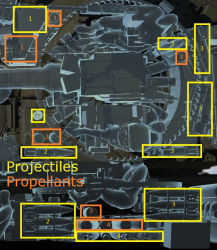
| Full ammo |
1st rack empty |
2nd rack empty |
3rd rack empty |
4th rack empty |
Visual discrepancy |
|---|---|---|---|---|---|
| 43 | 40 (+3) | 37 (+6) | 22 (+21) | 0 (+43) | No |
Machine guns
| 12.7 mm 6P49 | ||||
|---|---|---|---|---|
| Mount | Capacity (Belt) | Fire rate | Vertical | Horizontal |
| Pintle | 300 (150) | 700 | -3°/+66° | -40°/+55° |
| 7.62 mm PKT | ||||
|---|---|---|---|---|
| Mount | Capacity (Belt) | Fire rate | Vertical | Horizontal |
| Coaxial | 2,000 (250) | 700 | - | - |
Usage in battles
As a modernized T-72B (originally known as T-72BU), the T-90A has a similar playstyle to its predecessors. Due to reduced mobility (but better than the previous T-72), it cannot perform the exact same tasks as the T-80 series. It has three main playstyles.
Flanking
The T-90A performs well as a flanker. The low profile, low engine noise, and strong armour makes this a scary opponent in urban combat. However, it must be said that the T-90A has a horrible reverse speed, meaning there is little to no chances of retreating, each shot must count.
Sniping
Sniping is another area in which the T-90A performs well, as it has adequate shell velocity and penetration. The HEATFS is not an amazing shell in terms of armour penetration or muzzle velocity, but if a target is hit, it will most likely disable critical components if aimed right. The use of APFSDS is critical in this playstyle as it reduces the chances of missing due to higher velocity and easier aiming due to higher penetration. Due to the low profile nature of the tank with strong armour and additional ERA, the T-90A should attempt to stay hull-down, exposing minimal silhouette. Countering enemy fire is relatively easy due to the strong turret and K5 ERA. The addition of the Shtora-1 APS makes this a hull down monster that cannot be attacked without exposure.
Frontline support
This playstyle is very risky, as your slow reverse speed will turn your tank into a coffin, but with access to the 3BM60 shot, it will become more viable. Do not do this alone. Always try to have at least two reliable teammates covering you. Your main goal in this playstyle is to cover offensives, defend and attack bases. Cover weaker tanks by attracting fire and secure base capturers. In this mode, you should not focus on making experience for your own, like capturing bases, but to ensure the achievement of victory. This style will mostly take your tank as sacrifice, unless played very carefully and prudently, but victory multipliers will overcome your losses.
Pros and cons
Pros:
- Shtora active protection system prevents otherwise lethal missiles from hitting the tank, ensuring that the tank's reactive armour lasts longer
- CONTACT-5 ERA provides excellent frontal and turret protection
- Very strong turret
- Access to the unlockable 3BM60 shell with very good penetration
Cons:
- Active protection system only covers whatever the turret is facing, meaning that you can still be blindsided by canny missile users
- Worst acceleration and top speed out of all top tier Russian MBTs
- Gun mantlet still a huge, and well known, weak spot
- Cramped interior, easy to knock out with a single shot
- Gun depression and elevation next to non-existent
- Shtora active protection system doesn't work for MCLOS (manually guided), SACLOS missiles with ECCM, and laser-guided missiles
- Slower gun handling that most of its counterparts
History
Devblog
In 1989, the Ural Design Bureau of Heavy Engineering developed a prototype of a modernized T-72B tank, designated as "Object 188". The vehicle was a deep modification of the Soviet main battle tank, with a number of modern technical solutions, including a new fire control system, guided weapons, combined protection and a completely innovative electro-optical active protection system. The tank successfully passed tests and was recommended for mass production under the designation T-90; its serial production began in 1992. Meanwhile, the systemic economic crisis in Russia forced the tank builders to stop serial production of the tank. Meanwhile, research and development on a further T-90 modernization continued for the needs of foreign operators, as well as the Russian Army. Soon, when the economic situation in the industry began to improve, the tank builders combined their developments into an upgrade program, the T-90A. Unlike the basic version, the new tank featured a slightly more powerful engine, and a welded turret with improved protection. The main difference is the increased fire potential: a new cannon and a modern fire control system with an advanced thermal imaging sight. The T-90A tank was produced from 2004 to 2011.
Media
- Skins
- Images
- T-90A Devblog Images
- Videos
See also
Links to the articles on the War Thunder Wiki that you think will be useful for the reader, for example:
- reference to the series of the vehicles;
- links to approximate analogues of other nations and research trees.
External links
| USSR medium tanks | |
|---|---|
| T-28 | T-28 (1938) · T-28 · T-28E |
| T-34-76 | T-34 (Prototype) · T-34 (1940) · T-34 (1941) · T-34 (1st Gv.T.Br.) · T-34 (1942) · T-34E STZ · T-34E |
| T-34-57 | T-34-57 · T-34-57 (1943) |
| T-34-85 | T-34-85 (D-5T) · T-34-85 · T-34-85E |
| T-34-100 | T-34-100 |
| T-44 | T-44 · T-44-100 · T-44-122 |
| T-54 | T-54 (1947) · T-54 (1949) · T-54 (1951) |
| T-55 | TO-55 · T-55A · T-55AM-1 · T-55AMD-1 |
| T-62 | T-62 · T-62M-1 |
| T-64 | Object 435 · T-64A (1971) · T-64B |
| T-72 | T-72A · T-72AV (TURMS-T) · T-72B · T-72B (1989) · T-72B3 · T-72M2 Moderna |
| T-80 | T-80B · T-80U · T-80UD · T-80UK · T-80UM2 · Т-80U-Е1 · T-80BVM · Object 292 |
| T-90 | Т-90А · T-90M |
| Trophies/Lend-Lease | |
| Germany | ▂T-III · ▂T-V |
| Great Britain | ▂МК-IX "Valentine" |
| USA | ▂M3 Medium · ▂M4A2 |


